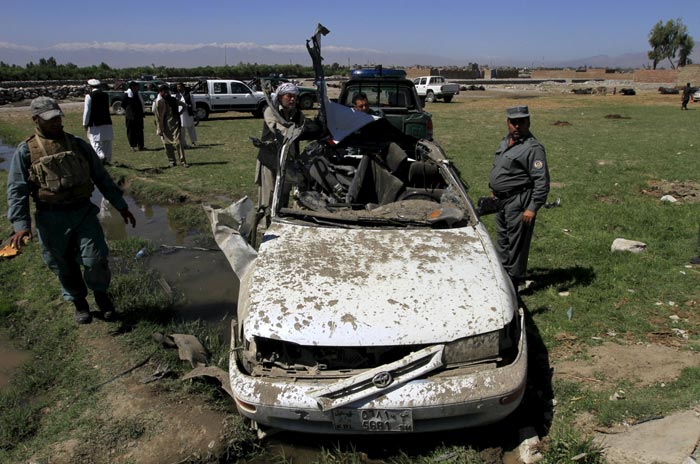Afghan policemen inspect the wreckage of a vehicle at the site of a roadside bomb at Bihsud district in Jalalabad province, on Wednesday. At least two persons were killed and two others wounded during the attack, provincial spokesman Ahmadzia Abdulzai said.
AFP/Kabul
The Afghan Taliban said their annual "spring offensive" will begin on Friday, vowing nationwide attacks in what is expected to be the bloodiest fighting season in a decade as Nato forces pull back from the frontlines.
This year's offensive marks the first fighting season in which Afghan security forces will battle the insurgents without the full support of US-led foreign combat forces.
The militants have already stepped up attacks on government and foreign targets in recent weeks, taking a heavy toll on civilians and Afghan security forces.
"The Islamic Emirate is going to launch the spring operations under the inspirational name of 'Azm' (determination) at 5 am on 24th April 2015," the Taliban said in a statement on Wednesday, using their official name.
"The main targets of these operations... will be the foreign occupiers, especially their permanent military bases... officials of the stooge regime, their military constellations, especially their intelligence, interior ministry and defence ministry officials."
Nato’s combat mission formally ended in December but a small follow-up foreign force has stayed on to train and support local security personnel.
US President Barack Obama last month backpedalled on plans to shrink the US force in Afghanistan this year by nearly half, agreeing to keep the current level of 9,800 US troops until the end of 2015.
The Taliban, who have waged a deadly insurgency since they were ousted from power in late 2001, warned that the announcement would damage any prospects of peace talks as they vowed to continue fighting.
Casualties rise
Aside from the Taliban, the Afghan government has also repeatedly warned of the Islamic State (IS) group making inroads into the country.
President Ashraf Ghani blamed IS for a suicide attack on Saturday in the eastern city of Jalalabad that killed 33 people and wounded more than 100 others. If verified, that would mark the first major attack by the jihadists in the country.
On Saturday, after months of stalemate, Afghanistan's new government announced appointees to fill every remaining post in cabinet - save the crucial one of defence minister.
The delay over the appointment has sparked fierce public criticism, with many blaming the recent uptick in deadly insurgent attacks on the leadership vacuum.
The upsurge in attacks has taken a heavy toll on ordinary Afghans.
The number of civilians killed and wounded in Afghanistan jumped 22% in 2014, according to the UN Assistance Mission in Afghanistan (UNAMA).
And in the first three months of 2015, civilian casualties from ground fighting were up 8% on the same period last year, a new UNAMA report said.
But in their statement, the Taliban said their "top priority will be given to safeguard and protect the lives and properties of the civilian people" during the offensive.
The Afghan government and Nato are yet to respond to the Taliban's announcement. In the past they rejected these offensives as propaganda.
Afghanistan's High Peace Council, the government body in charge of leading peace efforts with the Taliban, urged insurgents to abandon the fight and join the negotiating table.
"Evading talks and continuing war will not solve Afghan people's problems," it said in a statement that coincided with the Taliban announcement.
"The people favour peace and want to know the stance of the insurgents as soon as possible. We hope the warring sides use this historic opportunity to decide responsibly."

